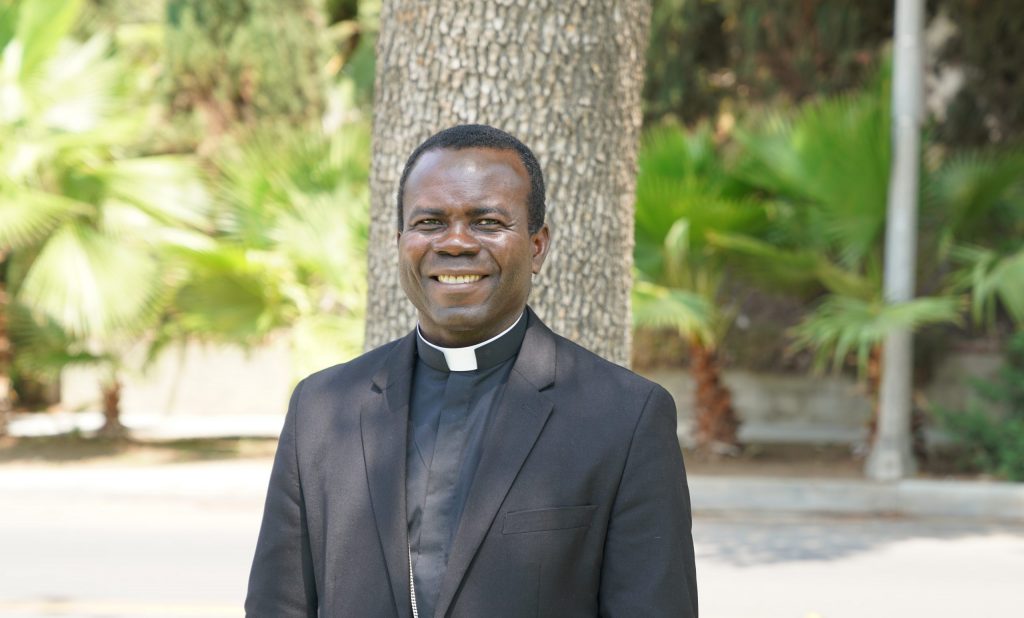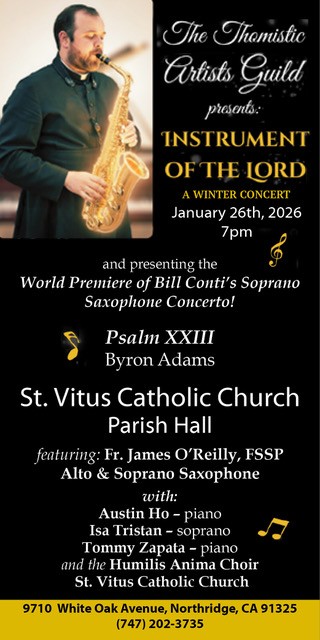When a priest becomes a bishop in the Catholic Church, he is asked to pick a phrase, usually from Scripture, as a motto for his new ministry.
When it was Father Moses Chikwe’s turn in 2019, the bishop-elect chose the Latin words “ad liberandum captivos” (“to free captives”) taking a line from the prophet Isaiah, later repeated by Christ in the Gospel of Luke: “To proclaim liberty to captives.”
He had no idea what those words would come to mean in his own life a year later.
Last December, the auxiliary bishop of Owerri, Nigeria, became the subject of news headlines, an international prayer campaign, and even a plea from Pope Francis when reports emerged that he and his driver, Ndubuisi Robert, had been kidnapped.
His release a week later was welcome good news in a country plagued by widespread violence and corruption, but for those who had followed his ordeal, questions remained. Who kidnapped the young bishop and his driver, and why?
Last month, Bishop Chikwe sat down to tell his story to Angelus. The 54-year-old was spending a few weeks in California, visiting priests from his home diocese in Nigeria and old friends from his 14 years in the area as a student priest and hospital chaplain.
Those friends will tell you that neither the years nor his new title have changed “Father Moses.” His face has hardly aged since he first arrived in Los Angeles as a student priest in 2003. His bright smile and infectious laugh still fill a room. But his mistreatment at the hands of anonymous captors, the days and nights spent marching through the African jungle, and the spiritual experience he recalls having during his captivity have marked Bishop Chikwe forever.
This is his story.
• • •
As far as Sundays go, Dec. 27, 2020, had been a smooth one for Bishop Chikwe.
In the morning, he celebrated Mass at the parish where he lives. Afterward, he spent time in his home with families from the parish, and later in the afternoon set out to see an old friend, a woman in her 80s visiting from Lagos, Nigeria’s largest city, with her children.
Bishop Chikwe and his driver, Robert, prayed the rosary on the drive back as the sun was setting over Owerri. They were just a few blocks from home and Bishop Chikwe was slipping his rosary beads back in their pouch when a van suddenly stopped in front of them, blocking their way forward. Four men with guns dressed in police uniforms emerged and ordered them out of the car.
When they asked Bishop Chikwe to get into the van, he refused. Instead, he tried getting the neighborhood’s attention.
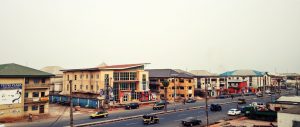
“I’m a bishop! I’m a bishop!” he yelled, dressed in his white bishop’s cassock.
The attackers told Bishop Chikwe that he was being stubborn. If he wouldn’t get into their car, he should get back into his.
That wasn’t an option for Bishop Chikwe, either.
“You want to die?” the men asked him. “It seems you want to die.”
“I’ve already given up my life to Christ,” Bishop Chikwe replied.
Impatient, one of the bandits pointed his gun at the bishop’s foot and fired, hitting the ground.
The bishop’s next memory is waking up in the trunk of the van. One of the gunmen must have knocked him out, he figures.
The vehicle arrived at a house a few hours outside of the city sometime around midnight, Bishop Chikwe remembered. He and Robert were stripped of their belongings, blindfolded, and forced to start walking barefoot through the Nigerian jungle in the dead of night.
• • •
It wasn’t until Bishop Chikwe and Robert began their march that he began to fully process what had just happened: This was a real kidnapping, and their lives were in the hands of these men. His mind filled with worry for his partner. Robert was married with four young children, the oldest 5 years old and the youngest still breastfeeding. What would they do without their father?
The band stayed on the move the next few days. A third captive, a woman, joined them along the way. They were placed in chains whenever they stopped. When it was time to sleep, the bandits would find a clearing in the jungle and spread a car cover for them to lay on.
Bishop Chikwe refused to eat that first night as well as the next day. He was upset at their captors, unable to understand why they were being treated this way.
But there was a moment in captivity that Bishop Chikwe said changed everything.
“I had this vivid image of the passion of Christ,” recalled Bishop Chikwe. “It came so clear to me: his being tortured, the crucifixion, the crown of thorns … when I saw that, I said to myself, I haven’t even gone one-half of what he suffered.”
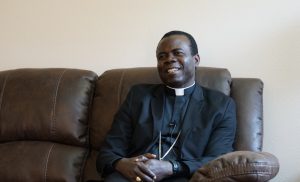
It was a moment he called “the saving grace” of his captivity.
“At that point, I said to myself: ‘Oh, these guys can beat me up, they can do everything to me. I don’t care anymore.’ So that numbed me, really. That numbed my body. Even when they slapped me and did all kinds of things to me and my driver, it didn’t matter to me anymore.”
“That moment was God’s own intervention, the saving moment,” he recalled. “It made everything easier for me, it helped me to endure whatever suffering and all that went into it.”
Another grace of the time spent “camping in the jungle” — as Bishop Chikwe now likes to call it — was the time for prayer and contemplation. He began to think of the timing of their capture: just as they were finishing praying to the Blessed Virgin Mary.
“I said to myself, ‘No, no, Our Lady will intervene,’ ” he remembered.
If she had any say in the matter, Saturday would be the day of their liberation, he thought. That was the day of the week the Church traditionally dedicates to the Blessed Mother, and in his own parish the bishop made a point of dedicating the day’s Mass to her most weeks.
Without his beads, Bishop Chikwe began praying the rosary with his fingers.
• • •
After a few days of walking around in the jungle, his captors asked Bishop Chikwe to call his boss.
He was handed a cellphone and dialed the number of Archbishop Anthony Obinna of Owerri, the man who ordained him a priest, and later, a bishop. He explained that the captors wanted 30 million Nigerian Naira in ransom, a sum equal to more than $70,000.
Both bishops explained to the bandits that the Catholic Church did not pay ransom. The bandits insisted they would keep their prisoners for as long as it took to get their money. They started walking again, this time to a place where they were told they’d get a taste of “real captivity,” with no food and no water.
It was there, at the lowest point of the bishop’s week in the jungle, that something he still struggles to explain happened.
The captives had walked for hours. They arrived at a remote part of the jungle, where the bandits’ leader was waiting for them.
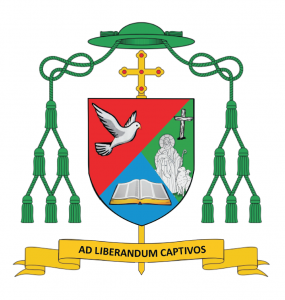
“Bishop,” the man addressed his captive.
“Boss,” he answered back.
The “kingpin,” as Bishop Chikwe called him, ordered his men to remove the bishop’s blindfold.
Bishop Chikwe figured the order could only mean one thing. Removing the blindfold meant he would see the kingpin’s face and be able to identify him in the future, a death sentence for any captive in this situation.
“Now that they have been told there’s no ransom, they know they’re not going to get anything,” he recalled thinking.
The afternoon sun was bright, and he squinted as the blindfold was removed. He kept his eyes facing down.
The kingpin asked him if he’d had any water to drink. No, Bishop Chikwe answered, to which the boss responded by telling his men to give him water, and a bottle of Coke, too.
He asked Bishop Chikwe to look at his face. The bishop tried raising his head, he said, but it seemed to automatically fall. He kept his face down as the man began to speak.
“I’m very sorry for what we did to you,” the kingpin started.
The kidnapping was a mistake, he said. He began to explain that he had “entered into this thing out of anger, frustration, and revenge,” Bishop Chikwe recalled, and claimed that on that Sunday in Owerri, the bandits had seen the car’s driver but hadn’t recognized the bishop in the passenger seat.
The leader said the captives would be set free that same day, without any ransom. He asked for the bishop’s forgiveness, and for his prayers.
“I forgive all of you,” the bishop recalled telling his captors. “And I said, ‘And if I have done anything wrong to any one of you, I also ask that you forgive me.’ ”
The men were indignant, insisting to the bishop that it was they who had offended him.
“You are the father of everybody!” one told them. “Of both good and bad!” another chimed in.
Before leaving the jungle and putting their captives’ blindfolds back on, the two men who had been guarding Bishop Chikwe and Robert knelt for a blessing.
• • •
Standing on a street in Owerri a few hours later, no one could have recognized the bishop the whole world seemed to be looking for.
The same van that had been used to kidnap Bishop Chikwe and Robert five days earlier had dropped them off late at night. Now, they stood in the street, barefoot and dressed in dirty clothes. If they had told passersby who they were, would anyone have believed them?
The bishop found a phone to call his secretary, who jumped out of bed to pick them up in his car. It was almost midnight.
“It was like a big breath of fresh air, that freedom,” said Bishop Chikwe when asked to describe that night. “That now I am free, that now I’m no longer in captivity was, I mean, my joy knew no bounds.”
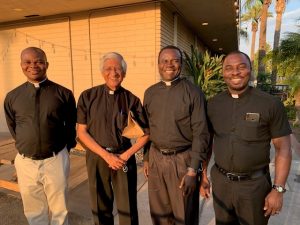
His joy seemed to multiply when he began to think about his prayer to the Virgin Mary. He had been sure she would help, and that their liberation would come on her special day of the week, Saturday. But she had done him one better, it seemed. Their release came a day earlier than he had predicted: Friday, Jan. 1, the day that the Catholic Church celebrates the feast of Mary, Mother of God.
“It came through to me that our Blessed Mother really intervened,” he said, chuckling.
The next day, he was taken to get a medical checkup. On Sunday, he celebrated Mass at his parish, where he was greeted with thunderous applause and sang a hymn of thanksgiving to God for their “miraculous” release.
In an odd development, nearly all of the bishop’s belongings were found dropped off at the Owerri cathedral, among them his bishop’s cassock, pectoral cross, and shoes. The bandits kept only his bishop’s ring and wristwatch.
• • •
After their release, the freed captives eventually learned that a nighttime police raid had narrowly missed them that week. The forces came so close, in fact, that the bandits abandoned their prisoners in the jungle that night and fled into hiding, before coming back to retrieve them later.
Bishop Chikwe also learned of the story of another Nigerian priest with ties to Los Angeles, Father Al Ezeonyeka, whom he had known during his time in California. He, too, had narrowly escaped death at the hands of armed bandits in Nigeria the same week of the bishop’s capture. (In another strange coincidence, Father Ezeonyeka also described being attacked while finishing praying the rosary.)
While Bishop Chikwe did not suffer lasting physical injuries during captivity, the ordeal left him understandably shaken. He is more sensitive to certain sounds, and feels the need to be extra vigilant while driving at night.
Even while in chains, Bishop Chikwe began to wonder if God had allowed the captivity to bring him closer to his people.
“I said maybe this is a good thing for me to go through, because now I feel the pain that everybody else in [Nigerian] society feels,” he said.
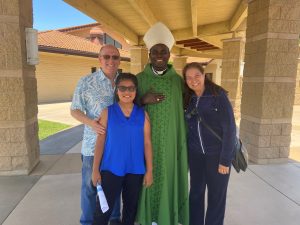
But perhaps the most enduring takeaway from the experience goes back to that line of Scripture, “to free captives.” In choosing that motto, he thought back to his time as a chaplain at a VA hospital in San Diego while a student priest. He often met veterans who were prisoners of grief, of addictions to alcohol and drugs, haunted by failed relationships, beset by a loss of hope and meaning in their lives.
“I’d go to bedsides and hear a lot of those stories, and I was touched deeply by what people were going through,” Bishop Chikwe said.
He is convinced that his time in California was a preparation for his future mission in Nigeria. Now that he has experienced a more literal kind of liberation, he said the experience made him “even more convinced of the God that we worship.”
“When I came out and was hearing that many people all over the world … even the Holy Father, were praying for our release, it touched me so deeply,” said Bishop Chikwe. “And it tells me how this universality of the Church, you know, it touches one part, and another is affected. And we are all in communion. So, that was a very powerful thing for me.”
